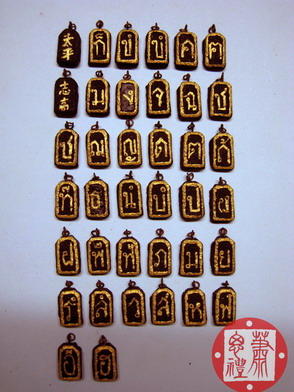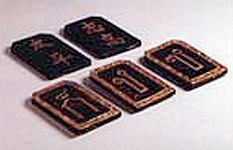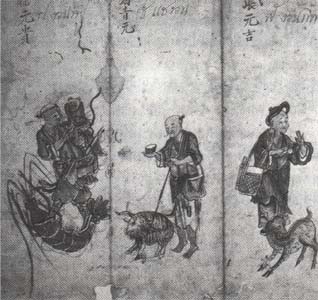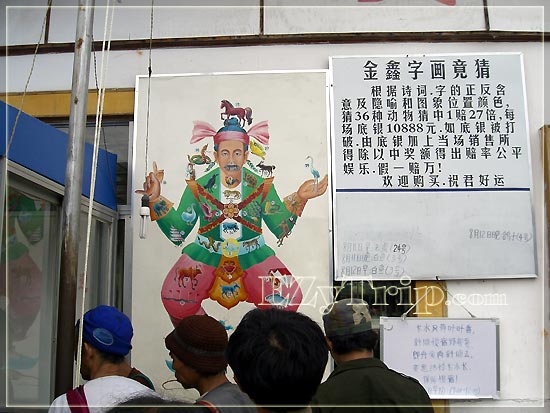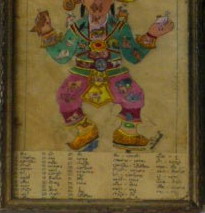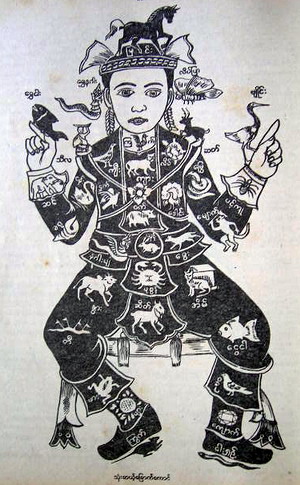Thailand / หวย ก. ข.
Vocabulary
หวย
หวย ก. ข. | | Lottery, Lottery abc |
| พรหมชาติ | pʰrom má cʰâat เล่ม | name of for fortune-teller book, name of a treatise in astrology |
| หวย | ˈhǔay | a gambling game in which players bet on letters or numbers. |
| ก | ˈkɔɔ | middle consonant, pronounced k initially and finally. |
| ข | ˈkʰɔ̌ɔ | high consonant, pronounced kʰ initially and k finally. |
| ไพ่ | ˈpʰây | playing cards |
| ต่อแต้ม | tɔ̀ɔ tɛ̂ɛm | dominoes, card game; playing card; gambling card |
| ไพ่ตอง | pʰây ˈtɔɔŋ | a Thai card game/the cards used in playing the game [suits] |
| คั่ว | khuaaF | to get three-of-a-kind in the Thai card game ไพ่ตอง |
| ตอง | dtaawngM | a trick of three cards in a card game called ไพ่ตอง |
| ไพ่ผ่อง | phaiF phaawngL | [name of] a Thai card game [bright cards] |
| อีแก่ | eeM gaaeL | [name of a certain] card game |
| ถั่ว | ˈtʰùa | gambling game |
| โป | ˈpoo | a kind of gambling game. |
Thai-English Dictionary
หวย hu-ie2 : Lottery; a system of gambling by betting on letters of the alphabet.
This is of Chinese origin and was introduced into Thailand in 1835 A.D.
The system, has it originally existed in China, was to place stakes on the names of pictures of thirty-four important personages of the period;
these were intended to represent the thirty-four letters of the lottery.
When introduced into Thailand, these were increased to thirty-six and, to popularize the system to the Thai, each was assigned a Thai consonant, each letter to represent the personage and the animal which was the former birth-state of the said personage.
On placing a bet, the better received a ticket and, if successful, received twenty-nine times the amount of his bet. The Huey lottery was stopped on April 1st, 1916 having had an existence of eighty-one years.
Description du Royaume Thai ou Siam: comprenant la topographie, histoire naturelle, moeurs et coutumes, legislation, commerce, industrie, langue, littérature, religion, annales des Thai et précis historique de la mission : avec cartes et gravures By Jean-Baptiste Pallegoix (1854)
Les jeux des grandes personnes sont le jeu d'échecs chinois, le tric-trac, les cartes chinoises et les dés.
On voit tous les jours des gens si passionnés pour le jeu, qu'après avoir perdu tout ce qu'ils ont, ils finissent par jouer même le langouti qu'ils portent sur eux.
Depuis quelques années, les Chinois ont établi une sorte de loterie dont ils ont le monopole ;
elle se compose d'une trentaine de figures diverses sur lesquelles on place l'argent qu'on veut, et si la figure sur laquelle on a placé vient à sortir, on gagne trente fois son argent.
Cette loterie fait fureur et cause un grand dommage au pauvre peuple, qui s'y fait gruger au profit du roi et des Chinois.
The kingdom of the yellow robe By Ernest Young (1907)
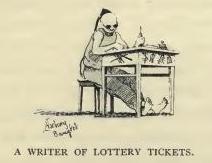 In every street there will always be found a Chinaman, wearing big goggles, sitting at a table in the front of an open house or shop, wearing upon his wooden countenance a quiet and meditative smile.
By his side is a small pile of thin sheets of yellow paper, and a quantity of writing material.
He is an agent of the gambling farmer and deals in lottery tickets.
The Government farms out the monopoly and derives a considerable revenue from it, as in some years as much as thirty thousand pounds sterling has been paid for the privilege of being allowed to gently ease other people oftheir superfluous cash.
The lottery farmer chooses, every day, one out of thirty-four characters of the alphabet as the lucky one for that day.
He keeps the secret of his choice to himself, and leaves those people who are of a speculative turn of mind to guess the particular letter he has chosen.
Everyone is at liberty to try his luck. The gambler goes to one of the numerous writers of lottery tickets and names a letter.
The writer slowly inscribes the letter upon one of the sheets of paper.
He then folds it up, and on the back states his own name and address, the name and address of the purchaser of the ticket, and the amount paid for the same.
He keeps possession of the paper till the close of the day.
The city is divided into districts, over each of which the lottery farmer places a trustworthy overseer.
Towards evening the overseer visits every ticket writer in his locality, collects all the papers, and the money paid for them.
These he afterwards takes to the office of his chief. »At a given hour the farmer declares the winning letter and the papers are opened.
All those papers that do not bear the chosen character are thrown away and the money appropriated.
Those who have been fortunate enough to guess correctly the letter for the day, receive back twenty-nine times their stake, so that the man Who staked one pound receives twenty-nine as his reward.
The chances in favour of the proprietor of the I6ttery are so great, and so many thousands of people patronise him every day that he can easily afford to award a prize of high value to the few winners.
Some people endeavour to calculate their chances beforehand.
In every writer's house is placed a board divided into squares.
Every day from the beginning to the end of the month, the letter chosen is written in one of these squares.
The board is consulted by those about to try their luck, and they try to work out a system which shall guide them in their choice.
Many gamblers, especially if they are Chinese, consult their gods about the matter.
They go to the temples and stand in front of the altar.
There they find a bamboo box containing thirty-four strips of bamboo, on each of which is printed one of the letters used by the lottery farmers.
They address the presiding deity of the place and promise him abundance of fat pork and chickens if only he will be so kind as to help them in their venture.
After having made this tempting offer, one stick is chosen from the bundle.
The gambler looks at it, and then wonders if the gods are going to make sport of him.
He proceeds to test the sincerity of the deity. He takes two pieces of bamboo root, which have been flattened on the one side and rounded on the other.
He throws them into the air, exclaiming as he does so, "If I have chosen the right letter, let these two roots fall with the flat sides up."
Suppose they fall as he desires, he repeats the experiment, saying, "If I have chosen the right letter, let these two roots fall with the round side up."
Even if success again crowns his experiment, he still feels inclined to doubt the playful deity to whom he is appealing for counsel.
So he throws the roots yet once again — "If I have chosen the right letter let these two roots fall, one with the flat side up, and one with the round side up."
If they should fall in this way, he is practically certain the gods are with him.
He pawns everything he possesses and stakes every farthing he can obtain on the letter of his choice.
Thirty-three chances to one that he loses, and he may spend the rest of his life in extreme poverty, bewailing the fickleness of the god he supplicated.
In every street there will always be found a Chinaman, wearing big goggles, sitting at a table in the front of an open house or shop, wearing upon his wooden countenance a quiet and meditative smile.
By his side is a small pile of thin sheets of yellow paper, and a quantity of writing material.
He is an agent of the gambling farmer and deals in lottery tickets.
The Government farms out the monopoly and derives a considerable revenue from it, as in some years as much as thirty thousand pounds sterling has been paid for the privilege of being allowed to gently ease other people oftheir superfluous cash.
The lottery farmer chooses, every day, one out of thirty-four characters of the alphabet as the lucky one for that day.
He keeps the secret of his choice to himself, and leaves those people who are of a speculative turn of mind to guess the particular letter he has chosen.
Everyone is at liberty to try his luck. The gambler goes to one of the numerous writers of lottery tickets and names a letter.
The writer slowly inscribes the letter upon one of the sheets of paper.
He then folds it up, and on the back states his own name and address, the name and address of the purchaser of the ticket, and the amount paid for the same.
He keeps possession of the paper till the close of the day.
The city is divided into districts, over each of which the lottery farmer places a trustworthy overseer.
Towards evening the overseer visits every ticket writer in his locality, collects all the papers, and the money paid for them.
These he afterwards takes to the office of his chief. »At a given hour the farmer declares the winning letter and the papers are opened.
All those papers that do not bear the chosen character are thrown away and the money appropriated.
Those who have been fortunate enough to guess correctly the letter for the day, receive back twenty-nine times their stake, so that the man Who staked one pound receives twenty-nine as his reward.
The chances in favour of the proprietor of the I6ttery are so great, and so many thousands of people patronise him every day that he can easily afford to award a prize of high value to the few winners.
Some people endeavour to calculate their chances beforehand.
In every writer's house is placed a board divided into squares.
Every day from the beginning to the end of the month, the letter chosen is written in one of these squares.
The board is consulted by those about to try their luck, and they try to work out a system which shall guide them in their choice.
Many gamblers, especially if they are Chinese, consult their gods about the matter.
They go to the temples and stand in front of the altar.
There they find a bamboo box containing thirty-four strips of bamboo, on each of which is printed one of the letters used by the lottery farmers.
They address the presiding deity of the place and promise him abundance of fat pork and chickens if only he will be so kind as to help them in their venture.
After having made this tempting offer, one stick is chosen from the bundle.
The gambler looks at it, and then wonders if the gods are going to make sport of him.
He proceeds to test the sincerity of the deity. He takes two pieces of bamboo root, which have been flattened on the one side and rounded on the other.
He throws them into the air, exclaiming as he does so, "If I have chosen the right letter, let these two roots fall with the flat sides up."
Suppose they fall as he desires, he repeats the experiment, saying, "If I have chosen the right letter, let these two roots fall with the round side up."
Even if success again crowns his experiment, he still feels inclined to doubt the playful deity to whom he is appealing for counsel.
So he throws the roots yet once again — "If I have chosen the right letter let these two roots fall, one with the flat side up, and one with the round side up."
If they should fall in this way, he is practically certain the gods are with him.
He pawns everything he possesses and stakes every farthing he can obtain on the letter of his choice.
Thirty-three chances to one that he loses, and he may spend the rest of his life in extreme poverty, bewailing the fickleness of the god he supplicated.
Anyone who can write can set up a stand, for it is the policy of the farmer to have his agents scattered all over the city.
The overseers are not directly paid for their services, but on the contrary, actually pay to be allowed to hold the office.
The writers of the tickets receive a commission of one shilling for every forty-four shillings they hand to the overseers.
The overseer receives from the farmer the same proportion of the total amount he collects each day.
Thirty times the sum actually staked is handed to the writer of a correct letter.
He then hands over to the winner twenty-nine times the sum, so that he gets a further profit of one-thirtieth of all the winning money that passes through his hands.
A few years ago, the gambling farmer lost a considerable sum of money through his own indiscretion.
He had obtained a new wife of great beauty, of whom he was passionately fond.
One day she asked him what letter he had chosen for the winning one. "Why do you wish to know? " said he.
Woman-like, she replied, "Oh, I merely asked you out of curiosity."
"Well," said the infatuated adorer, "promise me that you will on no account reveal it to any single person you may meet. Remember, if people were to know what letter I had chosen, I should lose a tremendous sum of money."
The new favourite answered, "I promise not to tell."
He gave her the letter, and faithful to her promise, she kept the secret.
But she went to one of the writers and staked all the money she had on what she knew was to be the lucky character.
The writer knew who she was, and jokingly asked her why she had chosen that particular letter.
She answered that she had simply selected it as any one else might have done in order try her luck.
Several people standing by heard the conversation, and learning that the chief had been to see her the day before in her own quarters, they thought it extremely probable that she was in possession of that day's winning number.
They promptly followed her example, with the result that her confiding spouse lost several thousand dollars on the day's transactions.
He at once accused her of betraying his trust, and although she pleaded her innocence, he sold her within a few days to gratify his want of revenge, or perhaps, to recoup himself in part for the losses he had sustained as the result of his own folly.
In the small gambling houses that abound, various games of chance are played all day.
They are open to the road, and are always fairly well filled. Idlers strolling by with an odd cent in their waistband, step in and lose it, and then pass on their way to give place to others who seek easily-made fortunes.
The games played require no skill on the part of those who play. It is all pure chance, as the following descriptions will show.
A Brief History of the state lottery in Thailand in Remembering the Pop Queen: The Cult of Phumphuang Duangchan and Lottery Mania in Contemporary Thailand By Pattana Kitiarsa
A Brief History of the State Lottery in Thailand
The link between lottery mania and the worship of the pop queen's ghost
requires a further understanding of the cultural history of the Thai lottery and its
practices in relation to supernaturalism. Lottery mania is not new to the Thai. It has
been argued that the lottery has enjoyed wide popularity since its first introduction
into the Kingdom of Siam in the second half of the nineteenth century. Writings by
three Siamese scholars (Anuman Rajadhon 1967; Kanchanakhaphan 1977; Thepchu
Thapthong 1992) revealed that lottery (huai) fever was widespread among the
Bangkok population from the beginning.
The Thai term for lottery, "huai," merits full consideration. Huai is the
colloquial term for lottery. When the government-run lottery system was invented
and introduced to replace the pre-existing Chinese-Style alphabet lottery in 1918,
the term huai was adopted along with "slak kin baeng," which was a Thai
translation of "the lottery." The use of the term huai in the Thai language has
persisted, and the term has been widely used until the present. It refers to both legal
and illegal lottery games (see Kanchanakhaphan 1977:105-106).
The origin of the lottery in Thailand can be traced back to the early
modernization of the Kingdom of Siam, when the lottery was operated and
monopolized by Chinese immigrants. The Siamese government saw the lottery and
other forms of gambling as monopolized venues in which quick and easy money
could be made. Writing from his childhood memories of the 1920s, Anuman
Rajadhon (1967:162, 174-75) contends that there were many lottery and gambling
houses in Bangkok (i.e., in Bang Rak, Sam Yod, and Ban Tawai districts). The
lottery game was based on the Chinese alphabet lottery, which was adapted to the
Thai writing system. It was known as huai ko kho (the "Thai Alphabet Lottery,"
'Xo Kho" representing the first two Thai consonants). The majority of lottery and
gambling house operators were Chinese immigrants who had already gained an
important role in the Kingdom's local and international economy during that time.
A wealthy Chinese merchant in a particular market town or district usually applied
for a license to operate a lottery house from the government. A licensed operator
was called khun ban huai (literally, "lottery house operator"). An operator would
run this monopolized business in his area, and pay revenues to the government.
Both Anuman Rajadhon (1967:175) and Kanchanakhaphan (1977:112-113) confirm
that lottery operators had representatives in almost every major store in market
towns. The alphabet lottery was quite a simple game and everyone was capable of
playing. There were no restrictions as to age, sex, or other qualifications of lottery
players. With only with small change in hand, one could go to an operator and
request to bet on one's preferred letters. The reward, at thirty-to-one, was
considered very high when compared to other kinds of gambling (i.e., Chinese cards
and slot machines) (Anuman Rajadhon 1967:178).
As put forward by Veblen (1967:107), "the chief factor in the gambling
habit is the belief in luck...It is one form of the animistic apprehension of things."
The early lottery fever in the Kingdom of Siam came together with superstition.
Magical and superstitious means were employed in order to hunt for winning
numbers. Magical monks and spirit mediums already played an important role as
providers of lucky lottery numbers. Anuman Rajadhon (1967:186-88) discusses the
popular superstitious and magical means which were employed by ordinary Siamese
gamblers more than a century ago. Hunting for lucky alphabets by worshipping
spirits, and taking particular trees or leaves as auspicious signs, was quite common
back then. Some lottery gamblers visited spirit mediums or magical monks. In every
lottery house, well-composed poetry to provide "hints" to lucky letters was posted
to attract gamblers' interest prior to each lottery draw. Giving these hints in writing
or in person (i.e., to those seeking advice from spirit mediums or magical monks)
was known as "bai huai. " These practices have not only persisted in contemporary
Thai society, but have also led to a booming lottery-relating publishing business, as
well as to an increase in famous Buddhist temples and spirit shrines throughout the
country.
Lottery and gambling houses were eradicated during the reign of King
Vachiravudh (r. 1910-1925). The king considered them to be evil and immoral. They
did not fit into his civilizing and modernizing project. The government during that
time launched its nationalist and modernist campaigns to promote the national tri-
parlite of chat, sasana, phra mahakasat (the Nation, the Religion (i.e., Buddhism),
and the King). Gambling represented a negative practice since it was against
religious and moral principles. It was therefore banned. Both Anuman Rajadhon
(1967) and Kachanakhaphan (1977), who were active scholars during that time,
discuss how evil the lottery and other kinds of gambling could be. They argue that
many gambling addicts went bankrupt. Some had to sell every piece of their
belongings and property, therefore becoming heavily indebted. Prior to the abolition
of slavery during the reign of King Chulalongkorn (r. 1868-1910), some gambling
addicts sold their wives and children to be slaves.
In the 1930s, a government-run lottery was introduced to replace the
monopolized Chinese-based one and the Government Lottery Office was set up
(Knmgthepturakij, February 3, 1998). The lottery was considered the primary
source of quick and easy income for the government during the period of
worldwide depression following World War I. This "game of chance" has gained
popularity among the poor and the working class since then. Its business has been
retarded by major political events like the coup in 1932 and World War II, but
every government has relied on lottery-generated income for its administration.
However, the revenue generated by the government-run lottery has been
manipulated by the military dictators who came to power and have dominated Thai
politics since the 1950s. In the student-led protest against Marshal Thanom
Kittikhachon's government in October 1973, the office of the government-run
lottery was burned down. The protesters saw the office as a symbol of corruption
and evil, which was designed to deceive the poor. They set fire to, and destroyed,
the office building, which was located on Rajadamnoen Avenue in Bangkok.
The government-run lottery, as well as its underground or illegal version,
entered its most prosperous period in the 1980s and the 1990s. Lottery mania is
incorporated into national political and economic issues when the media focus on
the lottery issue in order to boost their sales. The majority of Thai daily newspapers
run the results of the bi-monthly lottery draws. Magazines dealing with the
government-run lottery and the underground huai are available in bookstores
nationwide (Daily News, October 30, 1998).
Lottery mania is one of the major factors underlying the re-emergence of
spirit-medium cults and the commercialization of Buddhism. Yearning for luck in
the form of winning lottery numbers and other kinds of success in life is the major
motivation for ordinary people to visit spirit shrines and Buddhist temples (Pattana
Kitiarsa 1999). The lottery phenomenon (as well as other kinds of gambling) is
superstitious in nature. Lottery players rely on superstitious and magical means in
order to hunt for lucky numbers. In this same way, I believe that lottery number-
hungry people and the sensationalist media are responsible for the rise of the cult of
the pop queen. The history of the Thai lottery suggests that lottery mania goes hand
in hand with religious/superstitious phenomenon (i.e., the worshipping of the ghost
of the pop queen at Wat Thapkradan, and other famous magical monks and spirit
mediums elsewhere in Thailand). Lottery-stimulated superstitious practices are very
common among the Thai, especially among rural villagers and members of the urban
working class.
Siamese Amusements (The Southern Literary Messenger Vol. XXIV no.5 May 1857)
So much for the stage and its tendencies, whence we now turn our attention to another pastime, perhaps even more widely extended in its influence, and certainly more totally demoralizing in tendency, than any of the others, i.e., gambling.
This is practised by all classes, from the king on his throne tc the poorest beggar who prowls at the gates of the great to find a scanty support, not " in the crumbs that fall from the rich man's table," but in the veriest refuse that is cast from his gate—from the beauteous Houri who dwells in the gilded halls and reclines under gorgeous canopies on the luxurious cushions of the Royal Harem,
to the miserable, half-clad, half-starved nun who performs the drudgery of the Budhist temples, and derives a scanty subsistence from the scraps and remnants left by the haughty priests, of whom these aged nuns are the despised menials.
So passionately devoted to this vice have the Siamese become, that though in other respects a kind-hearted and moral community, they will often sell their wives and children into perpetual slavery to obtain the means for gambling.
After these, with everything else available, has been sacrificed, so great is the infatuation of the poor victim, that he not unfrequently pawns his own liberty, and being gonerally unable to redeem the pledge, he thus becomes a serf for life.
Licensed gambling-houses are established all over the city of Bangkok, occupying every thoroughfare, open at all hours, and by their tempting appearance luring every unwary passer-by to enter and engage in this destructive sport.
The last king derived an annual revenue of not less than seventy-five thousand dollars from these licensed dens of iniquity, which fostered crime and infamy, and sacrificed, every year, the lives and liberty of thousands of his subjects, while he grew rich on the profits.
Sometimes dice are used, and occasionally small cowries, but neither of these is so much in vogue, or so high in favor, as cards. Their pack is composed of but twenty cards, of which there are but four suits, five to each suit.
The game most in favor is a species of whist, but they have other and inferior ones that obtain pretty generally among the lower classes.
The public gambling houses are frequented only by the working classes, and are often the theatres of the most debasing scenes, the most fearful crimes, and heart-rending tragedies.
The gambling of the nobles is carried on within their own palaces, and so far from being ashamed of such pastime, they often boast of spending thus most of their leisure hours,
and of winning or losing large sums thereby, and they never fail to invite, and even importune their visitors (not excepting the Missionaries) to unite in this their favorite recreation.
This, however, applies only to the male portion of the community, and to such elderly females as may happen to be mistresses.of their own actions—wives and daughters being strictly commanded to avoid all such dangerous pastimes, though it must be confessed they are not always obediont to the salutary injunction. This extraordinary care of the morals of females is wholly owing, however, to the fear of detriment to the purses of their husbands and fathers, as these lords of creation greatly prefer gambling off their own pistoles, to allowing them to make their exit through the hands of their wives and daughters.
During the reign of the last king, one of the lords of the Harem one day reported to his royal master, that several hundred of his majesty's wives had been guilty of the fearful crime of gambling,
and had made way with many thousand ticals from the royal treasury.
The charge was duly investigated and confessed by the fair culprits, who pleaded ennui and want of amusement in extenuation of their offence, and prayed his majesty's forgiveness, especially urging the extension of his clemency toward the offenders on the ground that only twenty thousand ticals (about $12,000) had been sacrificed,
and this, they farther pleaded, was " but as the drop to the ocean compared with the boundless resources of His Serene, Infallible Majesty of the Golden Sceptre."
The covetous old king, who loved money better than any thing else in the world, (not excepting the fair culprits themselves,)
had no sooner heard the terrible sum of twenty thousand ticals mentioned, than losing all patience, he summoned twenty officers of the seraglio to his presence,
and ordered them to proceed to inflict the fatherly discipline of thirty stripes on each of the offending ladies,
that they might be preserved in future from the corrupting and degrading vice of gambling.
Had it cost less to his majesty, their morals would have been considered safe without the infliction of this summary chastisement!
Whether these offending ladies considered their regal consort " infallible" on this occasion, we are left only to conjecture.
Amulets
Old cards
Nowadays' Diagram
Diagrams from the Shan State
Bulletin de la Société des études indo-chinoises de Saigon, Volume 11 1895 page 67? 70?
Par le nombre et l'importance de ses cercles de jeux, Bangkok est le Monte-Carlo de l'Extrême-Orient.
Dans des salles suffisamment éclairées, on voit de nombreux groupes d'indigènes
et même d'Européens autour de tenanciers chinois ramassant à pleines mains les mises presque toujours perdues.
Des disputes et quelques fois des coups s'ensuivent, mais le dessus reste aux Chinois, supérieurs en nombre.
Le jeu des 36 bêtes fonctionne également, sans compter les nombreux tripots clandestins.
La population siamoise de Bangkok est pauvre et misérable, malgré la richesse naturelle du pays. La cause n'en est pas entièrement due au peu d'ardeur au travail du Siamois.
Elle tient surtout à ce que toutes les fermes importantes sont entre les mains des Chinois qui ne négligent rien pour encourager l'indigène à devenir ivrogne et joueur, vices qui le mènent tout droit à l'esclavage. La suppression ou du moins une réglementation très sévère de tous ces coupe-gorges autorisés s'impose. Par malheur, le gouvernement royal ne peut plus le faire sans ébranler fortement
ses finances. Dans un avenir plus ou moins éloigné, Bangkok sera une ville française, mise en
communication directe avec l'Océan Indien par l'isthme de Krat, elle partagera avec Singapour l'honneur d'être un port central de permier ordre au lieu d'en être, comme de nos jours, sa dépendance.
Sons of the yellow emperor: a history of the Chinese diaspora By Lynn Pan 1994
Lotteries were popular, and in Thailand the hua-hui, a game in which players stake on thirty-six animals and the prize is thirty times the amount of the stake, was a revenue farm in itself.
The drawing of the lottery was held twice a day, and one heard tell that until the winning animal out of the thirty-six was announced, normal business could not resume.
In Singapore you could not move for the crowd of men, women, children and domestic servants that thronged Hong Kong Street, the place for the hua-hui lottery.
Websites
 In every street there will always be found a Chinaman, wearing big goggles, sitting at a table in the front of an open house or shop, wearing upon his wooden countenance a quiet and meditative smile.
By his side is a small pile of thin sheets of yellow paper, and a quantity of writing material.
He is an agent of the gambling farmer and deals in lottery tickets.
The Government farms out the monopoly and derives a considerable revenue from it, as in some years as much as thirty thousand pounds sterling has been paid for the privilege of being allowed to gently ease other people oftheir superfluous cash.
The lottery farmer chooses, every day, one out of thirty-four characters of the alphabet as the lucky one for that day.
He keeps the secret of his choice to himself, and leaves those people who are of a speculative turn of mind to guess the particular letter he has chosen.
Everyone is at liberty to try his luck. The gambler goes to one of the numerous writers of lottery tickets and names a letter.
The writer slowly inscribes the letter upon one of the sheets of paper.
He then folds it up, and on the back states his own name and address, the name and address of the purchaser of the ticket, and the amount paid for the same.
He keeps possession of the paper till the close of the day.
The city is divided into districts, over each of which the lottery farmer places a trustworthy overseer.
Towards evening the overseer visits every ticket writer in his locality, collects all the papers, and the money paid for them.
These he afterwards takes to the office of his chief. »At a given hour the farmer declares the winning letter and the papers are opened.
All those papers that do not bear the chosen character are thrown away and the money appropriated.
Those who have been fortunate enough to guess correctly the letter for the day, receive back twenty-nine times their stake, so that the man Who staked one pound receives twenty-nine as his reward.
The chances in favour of the proprietor of the I6ttery are so great, and so many thousands of people patronise him every day that he can easily afford to award a prize of high value to the few winners.
Some people endeavour to calculate their chances beforehand.
In every writer's house is placed a board divided into squares.
Every day from the beginning to the end of the month, the letter chosen is written in one of these squares.
The board is consulted by those about to try their luck, and they try to work out a system which shall guide them in their choice.
Many gamblers, especially if they are Chinese, consult their gods about the matter.
They go to the temples and stand in front of the altar.
There they find a bamboo box containing thirty-four strips of bamboo, on each of which is printed one of the letters used by the lottery farmers.
They address the presiding deity of the place and promise him abundance of fat pork and chickens if only he will be so kind as to help them in their venture.
After having made this tempting offer, one stick is chosen from the bundle.
The gambler looks at it, and then wonders if the gods are going to make sport of him.
He proceeds to test the sincerity of the deity. He takes two pieces of bamboo root, which have been flattened on the one side and rounded on the other.
He throws them into the air, exclaiming as he does so, "If I have chosen the right letter, let these two roots fall with the flat sides up."
Suppose they fall as he desires, he repeats the experiment, saying, "If I have chosen the right letter, let these two roots fall with the round side up."
Even if success again crowns his experiment, he still feels inclined to doubt the playful deity to whom he is appealing for counsel.
So he throws the roots yet once again — "If I have chosen the right letter let these two roots fall, one with the flat side up, and one with the round side up."
If they should fall in this way, he is practically certain the gods are with him.
He pawns everything he possesses and stakes every farthing he can obtain on the letter of his choice.
Thirty-three chances to one that he loses, and he may spend the rest of his life in extreme poverty, bewailing the fickleness of the god he supplicated.
In every street there will always be found a Chinaman, wearing big goggles, sitting at a table in the front of an open house or shop, wearing upon his wooden countenance a quiet and meditative smile.
By his side is a small pile of thin sheets of yellow paper, and a quantity of writing material.
He is an agent of the gambling farmer and deals in lottery tickets.
The Government farms out the monopoly and derives a considerable revenue from it, as in some years as much as thirty thousand pounds sterling has been paid for the privilege of being allowed to gently ease other people oftheir superfluous cash.
The lottery farmer chooses, every day, one out of thirty-four characters of the alphabet as the lucky one for that day.
He keeps the secret of his choice to himself, and leaves those people who are of a speculative turn of mind to guess the particular letter he has chosen.
Everyone is at liberty to try his luck. The gambler goes to one of the numerous writers of lottery tickets and names a letter.
The writer slowly inscribes the letter upon one of the sheets of paper.
He then folds it up, and on the back states his own name and address, the name and address of the purchaser of the ticket, and the amount paid for the same.
He keeps possession of the paper till the close of the day.
The city is divided into districts, over each of which the lottery farmer places a trustworthy overseer.
Towards evening the overseer visits every ticket writer in his locality, collects all the papers, and the money paid for them.
These he afterwards takes to the office of his chief. »At a given hour the farmer declares the winning letter and the papers are opened.
All those papers that do not bear the chosen character are thrown away and the money appropriated.
Those who have been fortunate enough to guess correctly the letter for the day, receive back twenty-nine times their stake, so that the man Who staked one pound receives twenty-nine as his reward.
The chances in favour of the proprietor of the I6ttery are so great, and so many thousands of people patronise him every day that he can easily afford to award a prize of high value to the few winners.
Some people endeavour to calculate their chances beforehand.
In every writer's house is placed a board divided into squares.
Every day from the beginning to the end of the month, the letter chosen is written in one of these squares.
The board is consulted by those about to try their luck, and they try to work out a system which shall guide them in their choice.
Many gamblers, especially if they are Chinese, consult their gods about the matter.
They go to the temples and stand in front of the altar.
There they find a bamboo box containing thirty-four strips of bamboo, on each of which is printed one of the letters used by the lottery farmers.
They address the presiding deity of the place and promise him abundance of fat pork and chickens if only he will be so kind as to help them in their venture.
After having made this tempting offer, one stick is chosen from the bundle.
The gambler looks at it, and then wonders if the gods are going to make sport of him.
He proceeds to test the sincerity of the deity. He takes two pieces of bamboo root, which have been flattened on the one side and rounded on the other.
He throws them into the air, exclaiming as he does so, "If I have chosen the right letter, let these two roots fall with the flat sides up."
Suppose they fall as he desires, he repeats the experiment, saying, "If I have chosen the right letter, let these two roots fall with the round side up."
Even if success again crowns his experiment, he still feels inclined to doubt the playful deity to whom he is appealing for counsel.
So he throws the roots yet once again — "If I have chosen the right letter let these two roots fall, one with the flat side up, and one with the round side up."
If they should fall in this way, he is practically certain the gods are with him.
He pawns everything he possesses and stakes every farthing he can obtain on the letter of his choice.
Thirty-three chances to one that he loses, and he may spend the rest of his life in extreme poverty, bewailing the fickleness of the god he supplicated. 